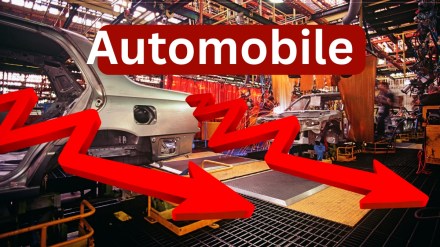Auto stocks like Maruti Suzuki, Bajaj Auto, TVS Motor and even Ather Energy, Ola Electric and Tata Motors, M&M were in focus after the rare earth mineral supply was curbed by China. The Nifty Auto, a basket of automobile stocks, have been under pressure as a result. Though there was some buying in early trade on hopes of a positive outcome from the US-China high-level meeting, it soon waned.
The Nifty Auto index has fallen 1.6% in the past five trading sessions, and if we look at the performance over 1 year, it has corrected by 5% in the past one year. Most of the stocks on the Nifty Auto index are in the red, with Samvardhan Motherson International’s stock price falling the most, cracking 1.4%. Ashok Leyland’s share price followed Samvardhan Motherson, correcting 0.82%. The list of key auto loser stocks included M&M, Bharat Forge, Maruti Suzuki, and others.
What’s the big worry for the auto companies
The reason why these auto companies are in a tizzy is because of the huge line-up of EV offerings and the key role that rare earth minerals play in the development of automotive parts. Rare earth magnets are low in cost but critical in function. Some key electric two-wheelers have been launched recently, including the EV bike from OLA Electric Mobility, Roadster X. Apart from that, 4-wheeler companies have a big pipeline of new EVs to be launched in the upcoming months.
“A disruption lasting beyond a month can impact electric vehicle (EV) launches, affect production and weigh on the sector’s growth momentum,” said CRISIL.
Several new electric four-wheelers are expected to be launched in India in the coming months. Some of the key models include Kia Carens Clavis EV, Tata Harrier EV, and Mahindra XEV 4e.
Crisil warned about the supply-side risk for the Indian automotive sector if China halts exports and delays shipments. “With the clearance process taking at least 45 days, this added scrutiny has significantly delayed approvals. And the growing backlog has further slowed clearances, tightening global supply chains,” said the credit rating agency.
Key auto stocks that saw maximum loss in last 1 month
Maruti Suzuki: Cuts near-term EV production
Maruti Suzuki slashed its production outlook for its electric vehicle, e-Vitara, for the first half of the financial year 2025-26. The company has cited disruptions in the supply of rare earth materials from China. Maruti plans to make 8,221 units between April and September 2025, which is almost a two-thirds reduction from the original target of 26,512 units, as per a company document seen by Reuters.
Bajaj Auto
“If this is true, it would mean that in a matter of weeks, the entire Indian EV industry will grind to a halt,” said Rajiv Bajaj in an interview with Moneycontrol. Bajaj added that heavy rare-earth magnets are vital for electric vehicle production.
TVS Motor
Sudarshan Venu, Managing Director of TVS Motor Company, said the restriction on rare earth magnets “could bring electric vehicle (EV) production to a halt” and added that it is “concerning.” Further, Venu added, “In the short term, it will impact the entire industry a fair bit.”
Sona Comstar
The Chinese government rejected Sona Precision Forgings’ (Sona Comstar) application to import rare earth magnets (REMs), making it the first Indian company to face such a decision under China’s tightened export control regime.
Why are rare earth magnets so important for auto sector?
According to CRISIL, rare earth magnets are an integral part of permanent magnet synchronous motors (PMSMs). These motors are used in EVs for their high torque, energy efficiency, and compact size. Not just EVs, but hybrid car models also depend on them for efficient propulsion. When talking about internal combustion engine (ICE) vehicles, rare earth magnets are largely used for electric power steering and other motorised systems.
US-China trade talks
The United States and China resumed trade talks in London. The world’s two largest economies will be talking over the curb of rare earth exports, visas for Chinese students, Trump tariffs, and other related matters. Last week, the Presidents of the US and China talked over a phone call ahead of the meeting.
Before, China and the US froze the raised tariffs on each other for the next 90 days after meeting in Geneva last month.
